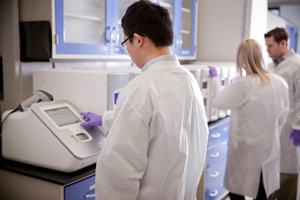Sepsis is responsible for more than 1.6 million hospitalizations each year in the United States, resulting in nearly 200,000 deaths and over $20 billion in associated healthcare costs.1-3 Sepsis is frequently caused by bacterial infections in the bloodstream. Traditional diagnostics for bloodstream infections can take as many as 2 to 4 days, forcing clinicians to treat suspected bloodstream infections empirically with potentially harmful and unnecessary broad-spectrum antibiotics while awaiting blood culture results. To confound matters, the treatment of serious bacterial infections in clinical practice is often complicated by antibiotic resistance.
Rapid diagnostic tests for bloodstream infections have been able to accelerate the time to bacterial identification and antimicrobial resistance detection by as many as 2 days over traditional phenotypic methods, allowing clinicians the opportunity to place the patient on the optimal therapy much quicker. Clinical implementation of these tests has been associated with improved patient outcomes, enhanced antimicrobial stewardship, more effective infection control, and has led to reduction in healthcare costs.4-8
The increase in adoption of rapid sepsis diagnostic tests has been driven, in large part, by clinical studies that have captured the clinical and economic impact of these tests. This webinar will look at a few of these studies and discuss the design, execution and clinical and/or economic outcomes achieved in each.
Speakers

Michael Saubolle, Ph.D., D(ABMM), F(AAM), F(IDSA), Medical Director, Infectious Diseases Division Laboratory Sciences of Arizona/Banner Health, Clinical Associate Professor of Medicine, University of Arizona College of Medicine
Dr. Saubolle received his Bachelor of Science degree and his Doctorate degree in Microbiology from the University of California at Davis. He participated in an American Board of Medical Microbiology (ABMM) accredited Postdoctoral Fellowship Program in Clinical Microbiology and Public Health at the University of Oregon Health Sciences Center in Portland. He is a Diplomate of the ABMM and a Fellow of the American Academy of Microbiology and the Infectious Diseases Society of America. He is the Medical Director, Infectious Diseases Division, Laboratory Sciences of Arizona, with oversight of microbiology services at Banner Health System Hospitals and at Sonora Quest Laboratories in Arizona. He has an appointment as Clinical Associate Professor of Medicine at the University of Arizona College of Medicine and is Co-Director of the Infectious Disease Block at the Phoenix Campus. Dr. Saubolle has authored or co-authored over 60 papers and book chapters. He has been on many advisory committees for the Arizona Department of Health Services, the CDC and the Clinical and Laboratory Standards Institute. He has given many invited presentations at the national and international level. His research interests include consensus on application of laboratory methods in diagnostics, improvement in patient outcomes, antimicrobial stewardship, and clinical issues with Nocardia.

Bert Lopansri, M.D, Associate Professor of Medicine, Division of Infectious Diseases, Intermountain Medical Center
Dr. Lopansri received his Doctor of Medicine from Loyola University of Chicago in 1997. He completed his residency at Loyola University of Chicago in Internal Medicine from 1997 – 2000 and a fellowship in infectious disease from the University of Utah Medical Center in Salt Lake City, Utah from 2000-2003. From 2003 through the present, Dr. Lopansri has worked at Intermountain Medical Center and is currently serving as Associate Professor of Medicine, Division of Infectious Diseases. Dr. Lopansri is board certified by the American Board of Internal Medicine for infectious diseases.

Melissa B. Miller, Ph.D., D(ABMM), Associate Professor, Pathology & Laboratory Medicine, Director, Clinical Molecular Microbiology Lab, Associate Director, Clinical Microbiology – Immunology Lab, UNC School of Medicine
Dr. Miller received her Doctorate of Philosophy in Molecular Biology from Princeton University in 2002. She completed a Post-Doctoral Fellowship in Medical and Public Health Microbiology at the University of North Carolina Hospitals between 2002 and 2004. Dr. Miller continued her career at the University of North Carolina and is currently Associate Professor of Pathology and Laboratory Medicine, Director of the Clinical Molecular Microbiology Lab, and Associate Director of the Clinical Microbiology – Immunology Lab. Dr. Miller’s research interests include the use of molecular methodologies to understand the basis of clinical treatment failures and inaccurate laboratory diagnoses with regard to infectious diseases. In addition, Dr. Miller is interested in the use of real-time PCR to develop more accurate, cost-effective and timely laboratory tests. Dr. Miller also focuses on outcomes studies aimed at measuring the clinical and financial impact of new diagnostic tests and algorithms.
Who Should Attend?
- Clinical Laboratory Directors, Supervisors and Technologists
- Infectious Diseases Clinical Pharmacists
- Infectious Diseases Physicians
- Critical Care Physicians
- Hospitalists
- Hospital personnel interested in antibiotic stewardship
Xtalks Partner
Nanosphere
Nanosphere is enhancing medicine through targeted molecular diagnostics that result in earlier disease detection, optimal patient treatment and improved healthcare economics. The Company’s versatile technology platform, the Verigene System, enables clinicians to rapidly detect the most complex, costly and deadly infectious diseases through a low cost and simple-to-use multiplex molecular diagnostic test. Currently, the Verigene test menu targets infections of the bloodstream, respiratory tract and gastrointestinal tract.
For more information visit www.nanosphere.us
Media Partner
You Must Login To Register for this Free Webinar
Already have an account? LOGIN HERE. If you don’t have an account you need to create a free account.
Create Account


